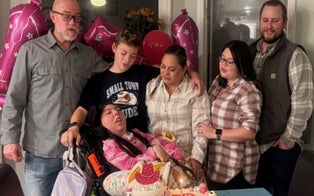As the threat of nuclear fallout escalates in Japan, journalists flee the danger zone to avoid contamination. INSIDE EDITION has the latest.
Correspondent Lester Holt gets a scare from a radiation detector as he covers the Japanese nuclear crisis for the Today show.
Holt had himself checked out in his hotel in Tokyo after returning from northern Japan. When the detector was run over Holt's shoes, the alarm sounded.
"Is that a good thing or a bad thing?" asked Holt.
"That's a bad thing," said the technician.
On the Today show, Holt said, "We did pick something up, he thinks perhaps dust as we walked along. The shoes had to be scrubbed down and even after that mine still didn't test properly so they are in a plastic bag and they will not be coming home with me."
Other U.S. reporters were fleeing the danger zone.
CNN's Anderson Cooper actually cut off his live broadcast in the middle of the show.
He tweeted: "Due to safety concerns we are leaving this area and therefore not live for the second hour."
And ABC anchorwoman Diane Sawyer is now on her way back home.
The rising radiation levels in Japan pose a dilemma for the networks who want to keep their reporters safe.
CBS, NBC, and ABC, normally fierce rivals, organized a conference call with CNN and Fox News to share information about the dangers in the fallout zone.
Here in the U.S., the crisis has triggered panic buying of potsassium iodide tablets, which can block radiation poisoning. Normally the tablets can be bought without a prescription. But at a drugstore in Santa Monica, California, and other drugstores around the country, the shelves have been stripped bare by residents concerned about a nuclear cloud heading their way.
NBC's Chief Medical Editor Dr. Nancy Snyderman had a warning for anyone thinking about taking iodide tablets as a precaution.
"This is not to be taken right now. This is in case you are going to be going into an irradiated area," said Snyderman.






